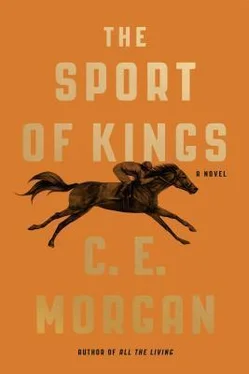3. NOTHING BUT A BURNING LIGHT
I’m going to ask the question. Please answer if you can.
Is there anybody’s children can tell me what is the soul of a man?
— BLIND WILLIE JOHNSON
In this act, Allmon comes up on the streets of Northside, down in the Mill Valley with its meager, misfit creek, squeezed between the university hill to the southeast and College Hill to the north, which has no college despite its name, just modest white houses portending the suburbs to come, white fingers pointing up from the city’s palm, pointing the way out. But Allmon never goes further north than Northside, because his mother, Marie, never does. Marie the sweet, Marie the naïve; Marie, the first in the family to escape Over-the-Rhine with a high school diploma and an associate’s degree and a dream of being a teacher — she wanted to teach children just like her own son — before she got sick. But now she’s still tall and straight, small-footed, large-breasted, she wears her hair in its natural twist behind a patterned scarf. Lipstick the color of a plum with Vaseline smeared over it and a child at her side, a beloved son born on her own birthday.
Just east of Northside, the Procter & Gamble factory runs day and night churning kernolate, chloride, silicate, sulfate, and, once upon a time, pork fat. The gray fumes rise and draw down the sky to a low lid the color of aluminum, so that even on the clearest day the Mill Creek runs gray beneath it. Cars tunnel through the smog-drift in the late afternoon; in pairs they descend over the viaduct and pass through the graceless valley on their way to the suburbs, leaving only fumes which rise and, look, the sun is setting now, rosy fingertips sliding down dirty glass. It fractures the filth in the air and makes a hundred thousand rainbows of it. Sherbet, roses, and cantaloupe orange, wedding pink, sheer white. The first thing Allmon will think of his small purchase of sky: I want to eat it. The streets, from Knowlton’s Corner north to the rise of College Hill, are turned rich metallic from a sunset that announces only the midmark of second shift in the factory with its gray leaden windows and turrets streaming banners of smoke. Inside, little white bricks of soap drop from the cooling mold to be wrapped in white wax paper, then gathered by the half dozen and rolled down the clattering line to a box, then sealed in the heart of Northside.
In the valley, asthma is rampant, and Allmon will suffer from it when he’s young, his body twisted by crowing fits as he takes his evening strolls with Marie down Hamilton Avenue, both mirrored against the windows of the brownstones and storefronts, their faces rosy with reflected pollution, copper-sulfite highlights in their hair. Marie sings under her breath as they walk. No one has ever said she is beautiful, but she’s young and that is a kind of beauty — still unlined, still so upright. Some people driving by will think fondly of their own mothers. Some will think, black girls have kids way too young. But name one who thinks, oh God, in a heartbeat this moment will pass and the young women will be cut flowers, as Marie and her son walk south to where Chase intersects Hamilton Avenue, the site of their first apartment, the first place Allmon will call home.
* * *
But again, the valley: they lived in the little valley, four miles from the river, and whenever the waters rose, as they did in 1884 and again in 1937, the gray river coursed along the low arteries of the city and swamped the heart of Northside. The wealthy lived on Cincinnati’s seven hills, and when the flooding came they gazed down from their heights, troubled.
* * *
On Chase, Marie and Allmon lived in a hundred-year-old building with thirteen other families in two-room apartments. In that first provisional place, summer came like an Egyptian plague, and Marie drew the blinds against the broiling heat. She took off her dress and paced the apartment in her underpants and nothing else and when she breast-fed her boy, she simply sat cross-legged on the floor like a worn, hapless Buddha, the child on her thigh. The plants drooped in the darkened air, the sun-rimmed blinds moved not one inch. She soothed his heat rash with creams and kissed his sweating head. Sometimes she cried over his pertussive crying and crushed him to her despite the heat. And when he napped, she sang a hush song, sang Hush a bye don’t you cry go to sleepy little baby when you wake you shall have all the pretty little horses blacks and bays dapples and grays coach and six white horses, hush.
Sometimes, there was a man in the house. He was a white man; he came and went. When it rained, the streets smelled faintly of the distant river.
They lived in that apartment until 1984 and just as Allmon was shaping memories out of the clay of his life, they moved. They moved because the white man came around less and less, and when he did come, there were fights. He was not tall, but he was beautiful despite a painful thinness, with a red-brown mustache like a fish draped over his lip. He had long, dark hair, a brief nose, County Kerry eyes, and cigarettes in his back pockets that made white bands of the denim there. He and his son napped together. The man was like a dry bath; to lie against him was to feel empty and sure, clean, though he smelled of cigarettes. Allmon’s mother placed green glass ashtrays all over the apartment so that when he came, he had only to reach over Allmon’s head to find the ashtray and tap the butt to the glass. Allmon said, “Where you been?” He said, “North and South Carolina, Georgia, Florida. I just spent two days on Lady’s Island. You know what they got there?” He didn’t. “Ladies!” He laughed, and his son laughed. “And I went to St. Augustine. You know what they got there? All the things you don’t know shit about.”
His arrivals always came unannounced, then his checks grew irregular, then the visits stopped, and boxes gathered in the center of the front room. The pots missing handles were gathered, along with the oxalis planters, Allmon’s many small shoes, and then his mother is hunched on the sofa, gathering her hair in her hands, her fingers clawing deep into her hairline.
“Momma, what’s wrong?”
“Nothing.”
“Momma—”
The look in her eyes stops his mouth. “I can’t do it. I can’t lose nobody else … I can’t do this by myself.”
So they left their apartment on Chase and moved down seven streets toward the turbid, southern end of the neighborhood, the cheaper end, where the viaduct crossed the sewage-strewn Mill Creek to Knowlton’s Corner, an intersection of five streets, where the commerce had once been so heavy a hundred years before that on any Sunday afternoon the crowds spilled off the sidewalks, shoppers forced into the streets as they milled past the butcher’s and stationer’s, grocer’s, the coffin maker’s, the pharmacy, souls all shoulder to shoulder. But when the city grew, the Saturday crowds drifted north, up the hills to the suburbs, and the southern end of the neighborhood went to poor working white, then to a checkered mix, now they just called it black, and Knowlton’s Corner took on the look of a place that once had been. The intersection was as careworn and antique as a wagon wheel, its spires strewn with broken glass and cigarette butts and glimmering oil, its hub home to a decaying costume shop, a gas station, a White Castle, and a corner store. It was here that Marie rented another two-room apartment, a tiny place, but loud with the sounds Allmon would associate with his early scenes: the freakish wail of sirens, the gruff fall of male voices, the Metro buses gusting by, dogs on the loose. In July, he would look down from their bay window and stare at the passing Independence Day parade. In the winter, the snow went gray as tobacco ash the moment it touched the street. And it was in this apartment that when Allmon would say, “I miss Daddy,” his mother would still say, “Me too, baby.”
Читать дальше
Конец ознакомительного отрывка
Купить книгу












